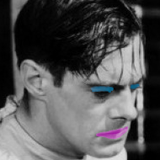Building a Sphinx

I was standing at the literal end of the world envisioning what lies beyond. The waves of the Pacific Ocean lapped at my feet as I stared west. The nearest piece of land in that direction was some unpopulated Siberian oblast. I could see it in my mind's eye: cold, barren and barely a hint of human settlement. I could see the years stretch forward and in the centuries that will follow I could see it, and the place I stood in Long Beach, Washington, underwater. At that moment, I finally understood catgirls.
The thing they don't tell you, at least not in such direct terms, is that estrogen is a mind altering chemical. Sure, the label says something about mood swings, but not the reason why: taking that little blue pill opens your third eye; the emotions are merely the side effect of experiencing an increased connection with the universe. Staring at the ocean, I saw through time and space. I felt all the joy and pain in the world. I saw a planet struggling to breathe. I saw its people slowly having their humanity stripped from them. I saw my body as a symptom of it all.
I had a body before all this. It felt… fine? Not great, but passable. It wasn’t right, though. It wasn’t mine. It felt disconnected from who I was as a person. It was broken in some fundamental way. It always had been. Eventually, it reached a failure point. Now, with a change of chemistry and an improved idea of what I wanted to it to be, it finally started to feel like it was a part of me.
Even though my body was now healing, I still couldn’t figure out what led it to break. Why couldn’t I exist as the man society wanted me to be? Would I have been able to handle it if my life played out differently? If I had children? If my wife hadn’t died? Immersion in a banal, heterosexual life probably wouldn’t have kept me happy, but it certainly could have kept me distracted. For how long, though? Even 20 years ago, my straight wife would joke about me being a lesbian in a man’s body. With good reason, too: I became obsessed with k.d. lang and Sleater-Kinney in college and, still firmly believing I was a straight man, I wrote a lesbian coming out story for a university anthology. I’ve always been a dyke, it just took four decades for my body to catch up.
No, this transition is not one of delusion, but necessity. With my estrogenated sixth sense, I could see my transness as it truly existed: as part of an ecosystem. This body is in crisis precisely because the world requires it to be. The planet cries out in pain. It strains against our weight and prepares to correct its anthropic mistake, meeting our violence with violence, and Gaia has demanded that I do what I can to separate myself from the violence of gender.
The early days of estrogen feel like a womb. I spend life currently as a 43-year-old embryo. I am being birthed into a world on the edge of collapse. So this new body will be a sphinx, a mythical catgirl. My four decades of stony sleep vexed to nightmare by a rocking cradle. From this sandy beach I will crawl, body of a lioness and the head of woman, and slouch towards Bethlehem to be born.

The sphinx, a hybrid creature of feline and human, has been a symbol of many things throughout millennia, but the poets of the 19th and 20th centuries truly understood them. William Butler Yeats, in the wake of a pandemic and world war, saw them as harbingers of a coming apocalypse. To him they stood as a reminder of societies long fallen and evidence that no kingdom stands forever. Empires, despite their insistence to the contrary, are an anathema to nature.
Yeats may have greeted The Second Coming with fear, but I do not. He knew the pain and sorrow associated with world’s end, but could not perceive beyond it like a t-girl can. From this beach, I see forests burning. I see cities underwater. I see famine and war, but I see planet finally able to heal.
I think Oscar Wilde, the old queen herself, had a better idea when he wrote The Sphinx. The narrator of the poem, with all the fervor of a Reddit incel, finds himself deeply interested in the sex life of an ageless sphinx and her cadre of mythological lovers. He begins by describing the supernatural beauty of the creature in front of him and imagines the history she has witnessed. Getting hornier and hornier on main, he then fantasizes about her paramours, both ancient monarchs and fabled monsters among them. Despite complete silence from this woman, the protagonist’s imagery gets kinkier and kinkier, culminating in what the kids today would call vore. The poem concludes, predictably, with the protagonist slut shaming the tigress and retreating to the comfort of his holy zaddy on the crucifix.
The poem's speaker did not understand who he was talking to, but Wilde saw this sphinx for who she truly was. As an avowed decadent, he not only knew this pussy would devour the narrator, she would devour society and he welcomed it. He understood the Victorian world was infecting every corner of the planet to provide untold riches to a select few. He saw it force strict adherence to those under its yoke, silencing cries for humanity both home and abroad. He realized it was corrupt to its core and it needed to be consumed.

It may be the pills or it may be living in a world that wants me dead, but I’ve begun to accept the climate apocalypse. I don’t welcome it and I will do my part to soften the blow, but it will come. It will come because we are part of a natural system and nature is self-correcting to the last. A new world will be born from it and humanity will need to adapt or perish. The good news is, while our structures are fragile, our species is a resilient one. Society will regrow from the ashes and as it learns to live in our new future, it will be better. It will be what it needs to be to survive: communal, queer, and genderless.
I may be delusional for having hope in the post-apocalypse, but transness is nothing if not hopeful. As cartoonist, sex worker and trans laureate Carta Monir wrote, ”Being trans is a prayer for and belief in something better.” One cannot choose to put on a dress, slap foundation on a five-o-clock shadow and go out in public unless they believe in a future world that doesn’t want to destroy them. One cannot endure years of dysphoria and the slow drip of change that estrogen provides without seeing a life less painful beyond it. Even if we don't believe that future will come in our lifetimes, we know it will be there for the ones who come after. If our bodies need to be a destructive force to make that happen, then so be it. If my transness will destroy the world, then what is born in the new one will be magnificent.
Our empire says I am a harbinger of its decline, so I will announce it proudly. I will be the sphinx. By being birthed, I will signal the planet's destruction. By living in it, I will signal its rebirth. I may not be the type of catgirl most dolls turn into, but I’ll be a catgirl nonetheless.


